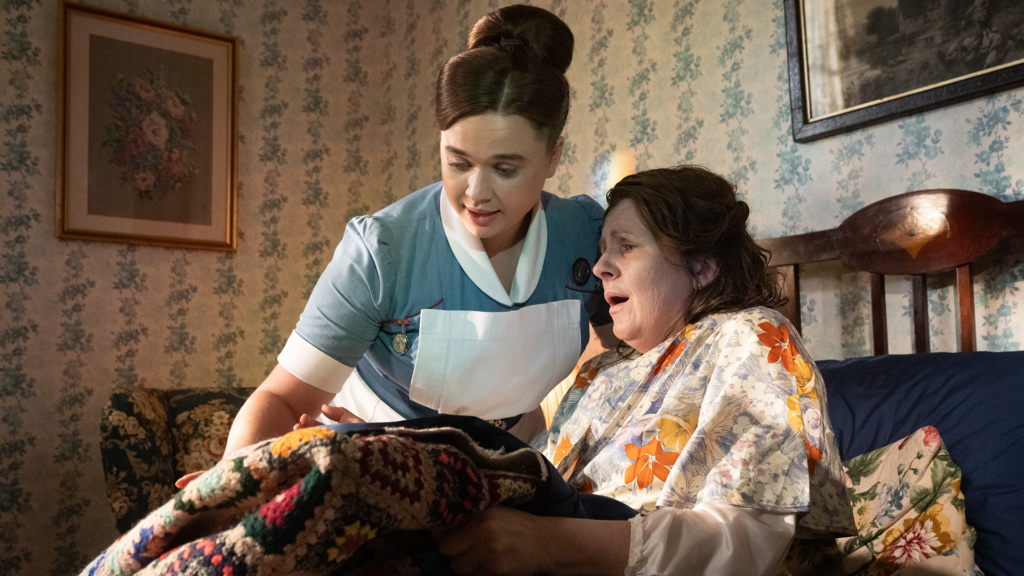
Call the Midwife is back for its 12th season and so are the faculty of the Vanderbilt University School of Nursing to provide historical and contemporary context in a weekly recap blog. Watch the show Sundays at 7 p.m. through May 7. SPOILER ALERT: Some posts may contain plot details.
For fans, starting a new season of Call the Midwife must be like a patient coming back to my office for a new pregnancy. There are familiar faces, older now. Some midwives have retired or moved on, new midwives have joined the group. I joined my practice as Nurse Lucille and I’ve aged into Nurse Phyllis Crane! Patients return, families grow, and the world changes both outside and inside the clinic.
As we’ve visited Nonnatus House year after year from 1951 until 1968, we’ve seen social and political upheaval affect the steady nuns and nurses. In this episode, we see political rhetoric and public opinion enter the private spaces where the midwives provide hands-on care to their patients. It first happens when Nurse Nancy assumes care of a woman with terminal cancer. Olive and Jessie introduce themselves as landlady and lodger, though they are devoted partners who’ve spent 25 years “hiding in plain sight,” as Jessie says when she reveals their relationship as Olive’s suffering intensifies. Visibly surprised, Nancy rallies and responds with simple support: “I’m her nurse, and you make her feel better.” Though Olive’s pain is severe, the couple refuse transfer to the hospital where they would be separated.
As Jessie sits vigil at Olive’s deathbed, political divisions rock Poplar. Enoch Powell was a real British politician remembered for his 1968 “Rivers of Blood” speech. As in this fictional account, the speech opposed mass immigration and anti-discrimination legislation. Powell was promptly dismissed from his government role, but polls at the time showed a majority of British people agreed with him. We see that support in Poplar: The unemployed dock workers organize a march to support Powell’s Britain First agenda, and Nurse Lucille’s patient brings anti-immigrant sentiments into the labor room. It was hard to watch Lucille endure Mrs. Pickard’s abuse. I was both appalled and approving when she finally talked back, then walked out.
These are fictional plotlines that rest on facts. Political rhetoric and public opinion still affect health care for marginalized communities and working conditions for health care providers. Research tells us that when LGBTQIA+ patients anticipate discrimination in the health care system, it’s a significant barrier to care – particularly at the end of life. Like Jessie, bereaved LGBTQIA+ partners can experience what’s called “disenfranchised grief”: grief that is unacknowledged because the relationship was invisible. Like Lucille, health care providers of color experience xenophobia and racism at work. One 2020 study found that 23% of doctors of color had a patient refuse their care explicitly because of their race. It’s so common that the American Medical Association suggests health care institutions develop preemptive policies to address patient bias in clinical encounters.
Call the Midwife is sometimes criticized for being saccharine, nostalgic. But I’m grateful for the hopeful last minutes of this episode: a montage of Poplar’s residents showing neighborly compassion as the narrator reminds us that change is not a threat, it’s a chance. In 2023, just as in 1968, individual kindness remains a powerful force against divisive political rhetoric.

Kate Virostko, MSN, CNM, is a member of the Vanderbilt Nurse-Midwives & Primary Care for Women at Melrose, the clinical practice of the Vanderbilt University School of Nursing.
